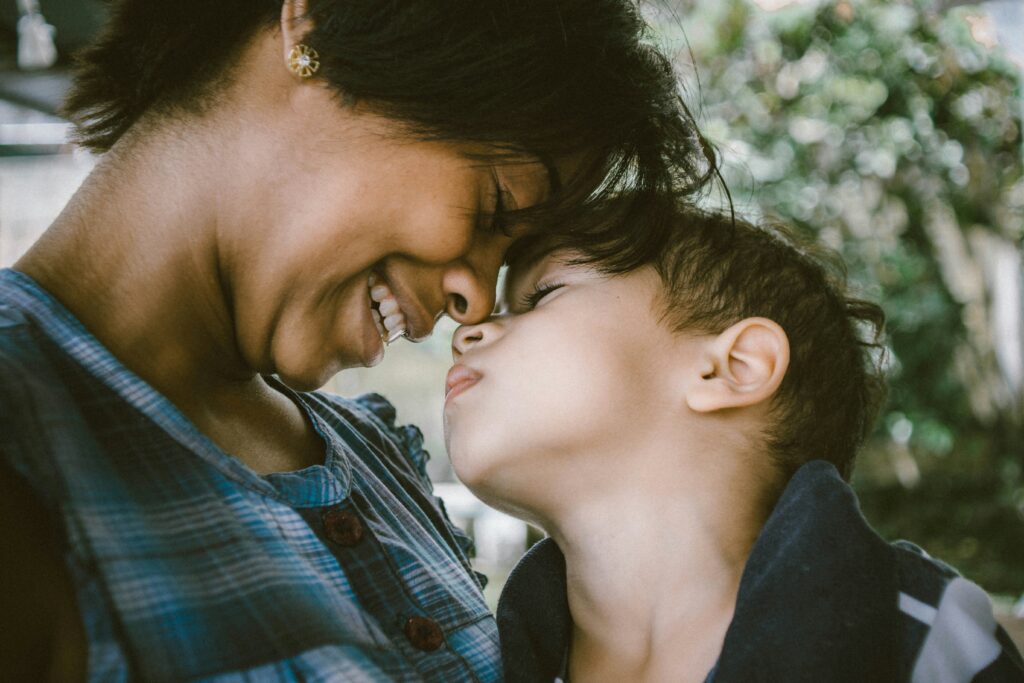There are many ways to parent with different families opting for different parenting styles from Montessori to authoritarian parenting. You might currently be at the start of your parenting journey and trying to work out what the options are and wondering if calm parenting is the one for you, or perhaps you are finding that your current methods aren’t as effective as you would like and are looking for alternatives, or maybe one of your children isn’t responding to your parenting style in the same way their siblings did so you need some help. Whatever the reason here is everything you need to know about calm parenting so you can decide if it is a parenting style that you want to use in your family.
What is calm parenting?
Calm parenting is a parenting style that emphasises maintaining a peaceful, patient, and empathetic attitude towards your child, even during challenging situations. It focuses on creating a positive, low-stress environment for both parents and children, allowing for better communication, emotional regulation, and problem-solving. By staying calm, parents can model emotional stability, helping children develop emotional intelligence and resilience.
Calm parenting is often used as an acronym detailing it’s four main pillars; Connect, Affect, Listen and Mirror.
Here’s a breakdown of what calm parenting involves and some specific strategies that you can utilise if you want to practice it:
Key Principles of Calm Parenting
Emotional Regulation
Calm parenting begins with parents managing their own emotions, in all honesty this is the most important part. By staying in control during stressful moments, parents can handle difficult behaviors or situations without escalating them. This doesn’t mean never getting frustrated, but rather knowing how to respond constructively to stress. If you are not normally a calm individual this can take some work. You will need to be mindful of your own actions and reactions and really work on your own response to stress. If you are the only person in your house with a parenting role you may feel that being calm will be easier, however if you are a two parent/guardian family then you will need to make sure that your partner is also on board with the calm parenting approach and that they too can regulate their own emotions otherwise you risk giving off mixed signals to your child.
Empathy and Understanding Parents practicing calm parenting try to see the world through their child’s eyes. They understand that children are still learning to manage emotions and behaviors. Instead of reacting with anger or frustration, calm parents show empathy, helping children feel understood and supported.
Consistency and Clear Boundaries Calm parenting isn’t about being permissive or avoiding discipline. It’s about setting clear, consistent boundaries with kindness. Children thrive on structure and knowing what to expect, and calm parents provide this without using harsh punishments or yelling. Calm parents will often use behaviour charts as a visualisation tool for monitoring behaviour, both good and not so good.
Positive Reinforcement Instead of focusing solely on what a child is doing wrong, calm parenting encourages celebrating positive behaviors. Reinforcing good choices with praise or small rewards which help children feel motivated to behave well. This also helps to boost the child’s confidence and makes them more willing to try things as they don’t fear failure and being told off if they get it wrong instead they look forward to the praise for trying and, hopefully, succeeding.
Modeling Behavior Children learn by observing their parents. Calm parents model how to handle emotions, challenges, and conflicts in a respectful and composed way. By demonstrating calmness, they teach their children how to manage their own emotional responses. This means allowing your child to see you respond to real life situations and not sheltering them from stressful situations.

How to Practice Calm Parenting
Here are some practical strategies that you can use when practicing calm parenting
Pause Before Reacting
When your child’s behavior triggers frustration or anger, take a moment to breathe before responding. This pause can help you regain control of your emotions and approach the situation thoughtfully. If you have a strong-willed child it can quickly become a battle of wills, they may be stubborn and you may get more and more frustrated, taking a breath and remaining calm is more likely to result in them returning to a calm state quicker and finding a compromise if needed. If you find this hard then verbalise it to your child, say something like “This behaviour has upset me, I’m going to go to my room and calm down and then we can discuss it.” This will show them that remaining calm isn’t something that just happens but something you have to be mindful off and work at, allowing them to work at it too.
Use Positive Language
Instead of using negative phrases like “Don’t do that” or “Stop it,” try rephrasing in positive terms. For example, say “Please walk inside” instead of “Don’t run inside.” This encourages cooperation without focusing on the negative.
Set Realistic Expectations
Understand that your child’s brain is still developing, and they may not always act rationally or follow directions perfectly. Adjust your expectations to their developmental stage, and be patient as they learn. Acknowledge what has gone right in a given situation even if the end result was not as intended, if they admitted they did something wrong or asked for help to fix something praise that action before you discuss the root of the issue. This will reinforce that they did the right thing in coming to you when they made a mistake. Often child will avoid getting caught or telling the truth for fear of being told off but as you stop yelling when you become a calm parent this fear should diminish too.
Focus on Connection
Building a strong, connected relationship with your child helps them feel secure and more willing to cooperate. Spend quality time together, listen to them, and show that you value their feelings and perspectives. This emotional bond can reduce conflict. It also opens up conversations and gives them a safe space to ask tough questions as they grow up.
Create a Calm Environment
Children respond to their surroundings. Having a home environment that feels calm and peaceful with minimal chaos, noise, and clutter will can help reduce stress for both you and your child. Help them to embrace this way of life by getting them to join you at tidy up time, decluttering their rooms and relaxing in a mindful manner so their go to preferred state is also calm over chaos.
Teach Emotional Skills
Help your child label and understand their emotions. For example, say “It seems like you’re feeling frustrated right now. Let’s talk about it.” Teaching them how to express and manage emotions in healthy ways gives them tools to cope with challenges without acting out. Likewise discuss your emotions with them too, if you’re too tired to play explain you need some time to chill as your feeling tired or stressed from work and once you feel better you will join in. This is much better than just saying no and leaving them feeling like it is something they have done to make you not want to spend time with them.
Practice Self-Care
Parenting can be overwhelming, and staying calm requires energy and mental clarity. Make sure to take care of yourself, whether through exercise, hobbies, or time alone, so you can better handle the ups and downs of parenting.
Problem-Solve Together
When conflicts arise, involve your child in finding solutions, create an action plan together and really work as a team. Instead of just punishing or scolding, calmly discuss the problem and brainstorm ways to fix it. This teaches responsibility and gives children a sense of ownership over their behavior. Once the issue is fixed, if it can be, involve them in the discussions around punishments too and explain why you have chosen what you have and let them discuss how that makes them feel. However, remember you are the parent and calm parenting is not parenting without boundaries or punishment it’s about parenting in a calm manner and with mutual respect.

Benefits of Calm Parenting
If you feel that calm parenting is for you and that you are able to successful regulate your own emotions effectively enough to mirror this to your child then you will reep a number of benefits as will your child. Here are just some of the main benefits of calm parenting
Reduced Conflict:
Children are more likely to cooperate when they feel understood and listened to, when parents handle issues without yelling or immediately dishing out punishment the child is more likely to discuss and reflect on their behaviour and learn from it. Allowing them to express themselves will reduce the conflict. If they don’t like homework and you struggle to get them to complete it allow them to explain why they feel like this whilst you explain your views on homework and how you’re not the one that has set it but you are the one that will help them with it if needed. Allowing them to vent and have their thoughts and feelings validated will help you to say good bye to the daily homework battles!
Improved Emotional Intelligence:
By modeling calmness and teaching emotional regulation, children learn how to manage their feelings in healthy ways. This is really important for your child’s future, especially as they enter their teenage years and will have to regulate hormones and mixed emotions like never before. Having these skills in place along side a safe haven in which they know they can have their voice heard will be very helpful as they transition through puberty.
Stronger Parent-Child Relationship:
The best part about calm parenting is that it brings the to of you together. Empathy and positive reinforcement strengthen the bond between parents and children, fostering trust and respect. This also means they will come to you for advice, tell you what’s really going on in their lives and make those tough talks during the teenage years easier.
Better Behavior:
Children who experience calm, consistent parenting are more likely to internalise rules and expectations, leading to better self-discipline.
Calm Parenting
Calm parenting is not for everyone. It can be very hard to get used to and may take some time. If you find yourself in a souting battle with your child and feel like you have failed then just take a breath, apologise to your child for loosing your temper and explain how you felt during that time. Use it as a learning process for bothyou and them and then continue to practice the above points. It is highly unlikely that you will become a calm parent over night just because you want to be, especially if you were not raised in this way and aren’t a naturally calm individual but that doesn’t mean you can’t make the hanges to be the parent you want to be for your children.
If you feel that your responses are always angry and result in shouting or even physical contact then seek advice from your GP as you may need help regulating your own emotions first.
